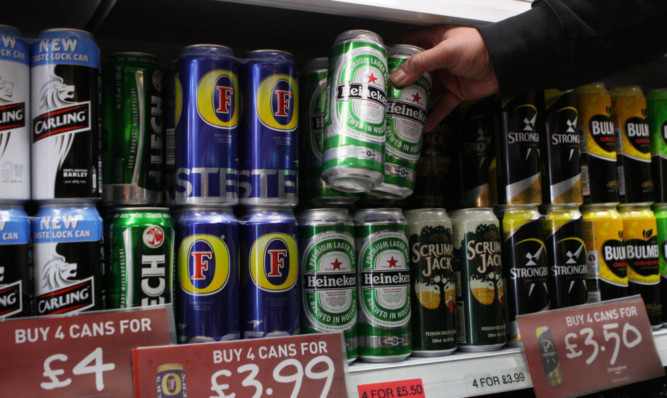Efforts to improve Dundee’s community regeneration areas are being blighted by the high number of off-sales shops selling alcohol.
A stark report by the city’s alcohol and drugs partnership on alcohol over-provision expresses concern about the problem.
Off-sales shops outnumber pubs and clubs in three of these areas and their existence, the study states, is significant.
The off-sales in Ardler/St Mary’s/Kirkton, Mid Craigie/Linlathen/Douglas and Mill o’ Mains/Fintry/Whitfield sell cheap alcohol in unlimited quantities and attract under-age drinkers.
In Mid Craigie/Linlathen/Douglas there are three times as many off-sales as on-sales premises, and one off-sales premises for every 500 people.
The report pulls together information on alcohol licence provision and alcohol-related harm across the city to inform the licensing board’s policy on over-provision.
It does not recommend a limit on the number of pubs, clubs and off-sales establishments that should be allowed to sell alcohol in particular areas.
The group, which is drawn from representatives of the police, health board, council and special interest organisations, says, however, that the board has “the ability and responsibility to contribute to a shift towards a healthier relationship with alcohol in Dundee”.
Dr Kirsty Licence of NHS Tayside said overprovision is important because increased availability of alcohol is associated with increased consumption and increased alcohol-related harm.
Availability can be controlled by restrictions on opening hours, number of outlets, price and age controls on alcohol purchase.
Dr Licence said: “Off-sales represent the most significant and fastest growing source of alcohol availability.
“Alcohol bought for consumption off the premises poses particular risks in terms of potential for under-age consumption, lack of supervision, and the likelihood that people will drink greater volumes of alcohol than in on-licence premises.
“The report recommends that the board’s final overprovision statement should allow it to decline any licence application or variation that would have the effect of increasing off-sales capacity across the city.”
Alcohol-related harm in Dundee is estimated to cost the economy £71.5m per year in productivity, health care, social care, and alcohol-related crime costs an average of £492 per head of population.
There is also a rising number of children growing up in homes where parents and carers have alcohol misuse problems.
The rate of alcohol-related A&E attendances varied from nearly one in 50 in Lochee to 1 in 200 in Broughty Ferry, and in 2011 the number of Dundee people discharged from hospital because of alcohol issues rose 10% to more than 1,000.
The report said Coldside, Maryfield and Lochee have consistently higher alcohol-related hospital admission rates than the Dundee average.
In the four years to 2009 the overall alcohol-related death rate was four times higher in Coldside than in Broughty Ferry.
The report will be considered by the licensing board, whose chairman David Bowes said he could not comment on it at this stage.
Mohammed Adrees, 40, whose family runs two convenience stores in Douglas, the community regeneration area with the highest proportion of off-sales, said they sold alcohol responsibly but he believed the problem did not lie with his type of business.
“There are supermarkets which, because of their size, can bulk buy and we can’t match their prices. It is the supermarkets that are selling the cheap alcohol.”
